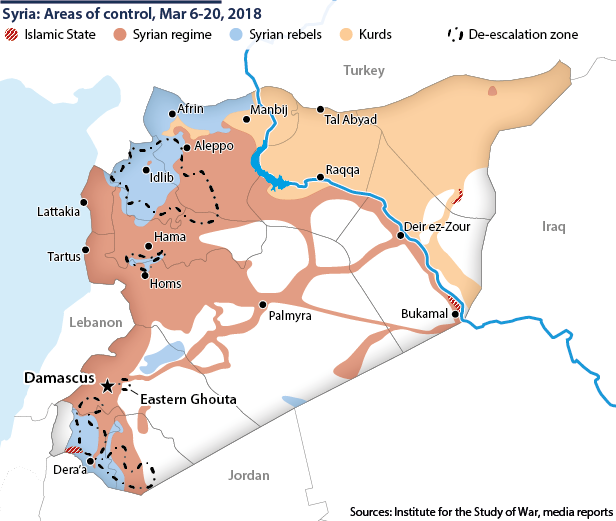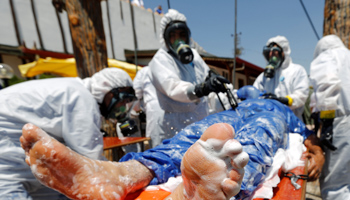Israel’s Syria strike may precede a new US operation
After reports of a chemical attack, Damascus faces increased international pressure
Airstrikes early this morning on a Syrian government base reportedly killed 14 people. Initial reports blamed the United States, which had been expected to react strongly to allegations of a devastating chemical attack on the last rebel outpost in Eastern Ghouta, attributed to forces loyal to Syrian President Bashar al-Assad. However, Israeli planes seem to have carried out the strikes, which are therefore related to a separate set of strategic calculations.
What next
A US-led military response to chlorine use allegations is still likely, focusing on units attributed direct responsibility. Russia will block any UN Security Council action but is unlikely to retaliate against US interests. Despite this, the government will capture the whole of Eastern Ghouta and move against rebels elsewhere, with the pragmatic Moscow-Tehran-Ankara alliance holding together and Washington remaining at a distance.
Subsidiary Impacts
- The centrality of Syria to Iran’s regional policy means it is unlikely to be deterred by repeated Israeli military actions.
- Ultimately, Israel may face a full ‘northern front’ conflict against Iran-linked forces in Lebanon and Syria.
- US military action cannot save the international norm banning chemical weapons, which has seen too many breaches.
Analysis
Russian military sources today claimed that Israeli jets operating in Lebanese airspace launched missiles overnight at Syria's T-14 airbase near Homs. Monitors reported that 14 people were killed, mostly Iranians or members of Iran-backed groups fighting for the Syrian government (see SYRIA: Militias could push the president towards Iran - April 5, 2018).
Iranian-Israeli confrontation
The Israeli military, as per its usual rule, refused either to confirm or deny responsibility for the strike.
However, the attack fits an overall pattern of heightened Israeli confrontation with Tehran in Syria.
Israel struck the same airbase in February, aiming to take out air defences, after an Iranian-controlled drone entered its airspace (see ISRAEL/IRAN: Aims will clash again in Syria - February 12, 2018). The T-14 base reportedly has an Iranian facility for resupplying its Lebanese ally, Hezbollah.
Further Israeli attacks on Iranian interests in Syria had been expected since reports of deepened Iranian entrenchment in the south of the country, including the construction of a new missile base near Damascus (see ISRAEL/SYRIA: Upcoming strike may risk wider conflict - March 1, 2018).
Israel has failed to persuade Moscow to restrain Tehran -- although Russian air defences in Syria normally turn a blind eye to Israeli strikes, provided they are informed in advance and the target is Iranian interests.
US red herring
When Syrian state television announced the attack, it originally claimed that it had been carried out by Washington. However, the Pentagon immediately denied that it was conducting airstrikes in Syria "at this time".
Reports of a chemical attack raised expectations of a US strike
There had been widespread anticipation of a strike by the US-led coalition following allegations of a chemical weapons attack in the rebel-held town of Douma, near Damascus, on April 7. The government reportedly used chlorine rather than a nerve agent -- an area in which the US 'red line' is more blurred, as similar alleged attacks have been ignored over the past year.
In this case, the high number of casualties (around 80 reported dead), together with graphic images of dead bodies of people who had been hiding in basements and children frothing at the mouth, sparked international outrage.
US President Donald Trump reacted angrily on Twitter to the reports. Unusually, heblamed Russian President Vladimir Putin personally, together with Iran, for "backing Animal Assad". He described the attack as "SICK!", demanded that Douma be opened for medical help and verification, and -- more routinely -- blamed his own predecessor for not enforcing the chemical weapons 'red line'.
A year ago, Trump responded to pictures of a sarin attack on the rebel-held village of Khan Sheikhoun, in Idlib, by ordering the launch of 59 Tomahawk cruise missiles at the airbase from which the attack was launched (see SYRIA: US strike will only stop chemical weapons use - April 7, 2017). A similar US response was widely expected on this occasion.
Israel may have timed its own strike to take advantage of these heightened tensions, for several reasons. The crossover of the two issues:
- raises Israeli concerns over Syria up the international news agenda;
- aligns the country with the United States and Western powers in opposing Assad;
- puts it in a position to press Trump to reverse his recent calls for withdrawal from Syria -- a stance reportedly protested by Israeli leaders (see SYRIA: US pullout would help Russia, Iran and Turkey - April 3, 2018); and
- shows that Israel is prepared to go it alone (as Defence Minister Avigdor Lieberman said on April 8) if the United States does withdraw.
Chemical retaliation to come?
The UN Security Council will hold an emergency meeting today to discuss the alleged chemical attack in Douma.
Moscow is likely to use its veto to block any action, backing the Syrian foreign ministry's line that the pictures are part of a "boring" and predictable Saudi-backed rebel plot.
The Russian foreign ministry claimed the reports were "fabricated" by the volunteer Syrian White Helmets rescuers, who it claims are linked to terrorists, in order to provoke military intervention. It has also warned that any such foreign reaction "may trigger the gravest consequences".
However, Western governments are strongly aligned on this issue: Washington and Paris have agreed clearly to establish who was responsible for the atrocity and then to act. This is also the first day in office for Trump's new National Security Advisor John Bolton, a notable hawk who has previously advocated Syria strikes.
Trump's strong words make him unlikely to back down over upcoming action
Despite the precipitate Israeli action, US-led strikes that more directly target the specific sources of the recent bombing of Eastern Ghouta are still likely to go ahead -- although there could be technical difficulties as the helicopters reported to have dropped gas-filled barrel bombs are harder to track than the jets used in the Khan Sheikhoun attack, with a higher likelihood of collateral damage if their bases are hit.
Nevertheless, existing deconfliction mechanisms can be used to protect Russian personnel, and the calculation is likely to be that Moscow will not follow through on its threats against US interests.
Balance of power
Any US attack will not change the fundamental dynamics on the ground in Syria.
The reported chemical attack came in the context of a last-ditch Syrian government assault after several weeks of intense attacks across the rest of Eastern Ghouta forced rebels in nearby towns to surrender. Jaysh al-Islam, holding Douma, may have initially agreed a similar evacuation deal, but this stalled, provoking harsher action.
In that respect, the chemical attack seems to have 'succeeded' by breaking the nerve of Douma's remaining population. Negotiations resumed on April 8, and evacuation buses again began removing people that evening to Turkish-controlled Jarablus, on the northern border, based on what residents described as a "final agreement" with Russia.
Despite his outrage over the chemical attack, Trump's fundamental desire to please his base by getting US troops out of a country is unlikely to change. Indeed, he may point to a successful cruise missile attack as proof an on-the-ground presence is unnecessary.
The chemical assault has temporarily raised tensions with Turkey, which condemned Damascus in graphic terms. In a speech to his party faithful, President Recep Tayyip Erdogan took the opportunity to repeat his accusations of Western hypocrisy for failing to respond.
It was left to his spokesman to blame Russia or Iran relatively mildly and indirectly, referring to "countries that have an influence on the Syrian regime".
In practice, therefore, the pragmatic alliance by which the three powers are carving up Syria is likely to continue. All is still on track for a rough 'stabilisation' that meets key interests for Moscow, Tehran and Ankara, excludes Western powers and leaves the Assad regime in place.

